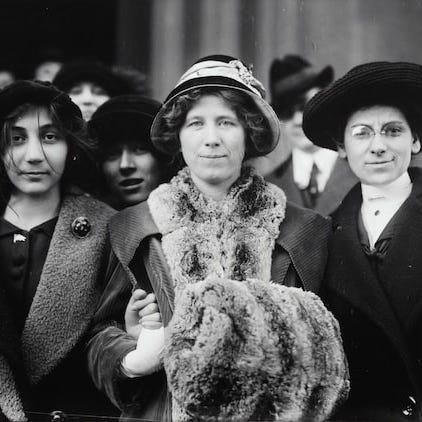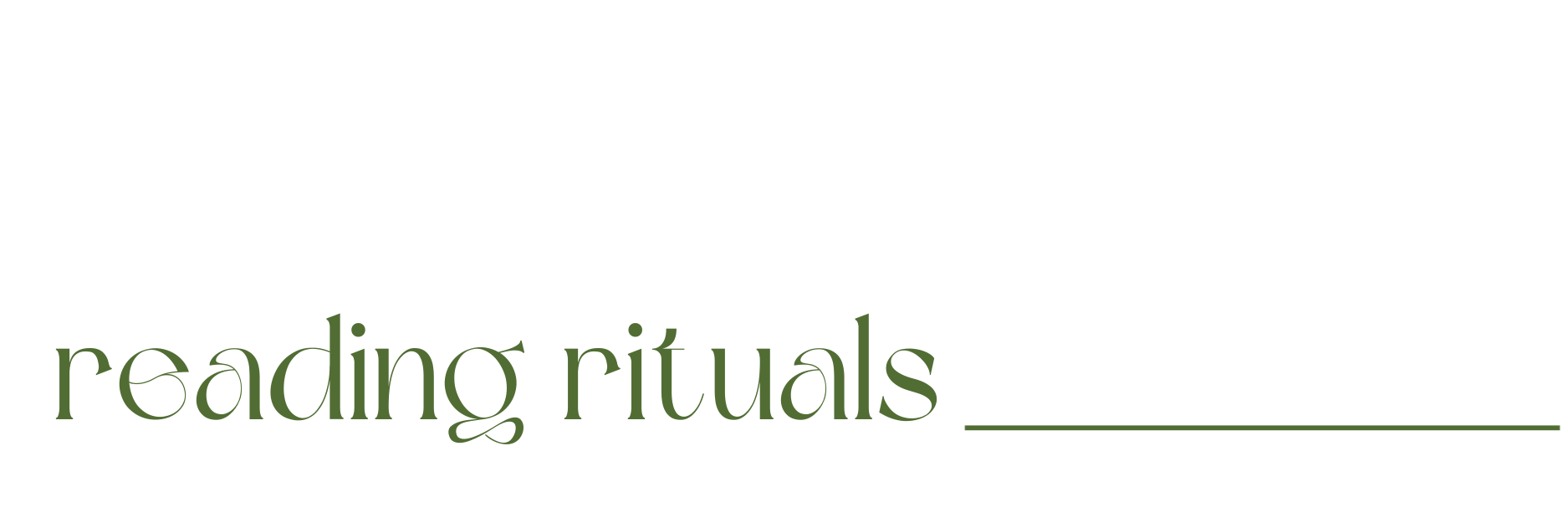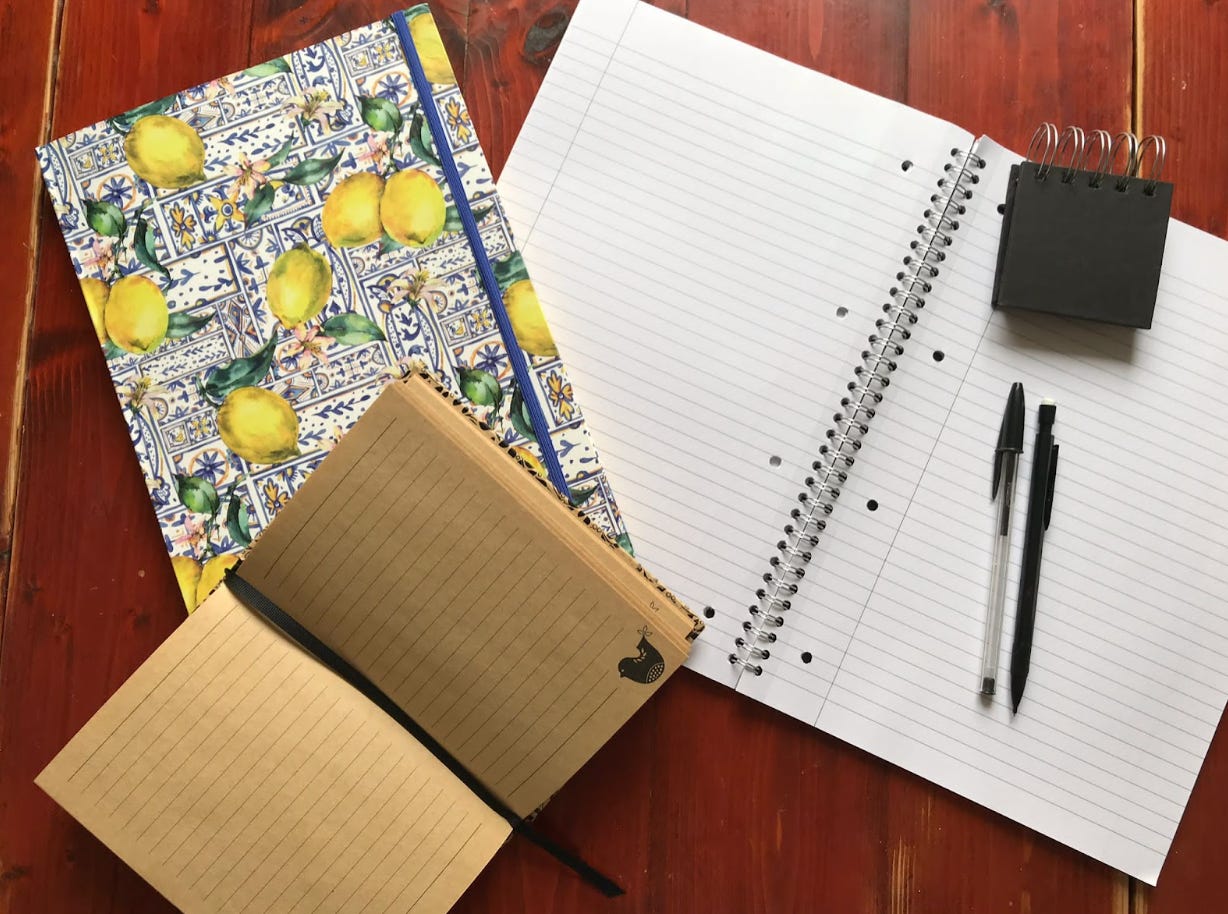Close Reader: an interview with Kate Jones of A Narrative of Their Own
On war-time narratives, screen time, and reading for fun again
In this series, “Close Readers,” I’m asking some of my favorite Substack essayists, Bookstagrammers, and writers to share their reading and writing processes and habits, and tell us about the literary ideas they’re spending time with these days.
Today’s interview is with Kate Jones, a brilliant scholar and writer who shares essays about women’s literature, after completing her Masters in modernist war-time fiction.
After you read today’s interview, check out Kate’s incredible essays right here on Substack:
Please note: all links and images in today’s post were provided by our lovely interviewee, Kate Jones.
Let’s start with an introduction! What’s your name and where are you currently living? Tell us a bit about you.
Hi! Thank you for having me here 😃
I’m Kate and I live in a city called Sheffield in the county of South Yorkshire in the UK. My city is quite special as despite it being the fifth largest in the UK, it is also the greenest in Europe — we have more trees here than people! A fact I love. We benefit from both the conveniences of a large city but are also right on the edge of the Peak District National Park, which is beautiful for long walks.
What are you reading right now?
I’ve just finished The Truants by Kate Weinberg, which my daughter loaned me and which was interesting…I’ve not quite made my mind up about it yet! I’ve also started rereading Claire Dederer’s book Poser as I’ve been working on writing some more personal style essays and it’s a genre I’m really into at the moment. There are some writers doing exciting things with the personal essay, such as combining essay and fiction, as with Sheila Heti’s Motherhood. In Poser, Dederer (who I think is a great essayist generally) appears to be writing about taking yoga up after the birth of her first baby.
But the book has so many more layers to it. Essentially, it explores the ways in which we have become obsessed with being ‘good’: as women, mothers, partners, friends, and it compares this with Dederer’s own mother’s generation in the 1960s and 70s. Dederer talks about a lot of the things that I think about around women’s narratives! I do want to get back into reading more fiction though, and am excited to start reading The Last Story of Mina Lee by Nancy Jooyoun Kim, which I just picked up from my local library and have heard good things about.
What are some of your favorite books or genres?
As I say, over the past few years I’ve really gotten into reading personal essays, and my favourite author of nonfiction has to be Joan Didion. I have a book with three collections of essays all in one volume, and I return to it regularly. It has many notes in the margins! I also love collections which combine personal narrative alongside literary discussions. So I loved Lauren Elkin’s Flȃneuse, and Elizabeth Boyd’s Fierce Appetites. I love how writers can take their own lives and interweave it with that of women and stories from literature. That would be the book I would love to write!
As I said above though, I want to get back into reading fiction again, but because of my studies, research, and writing over recent years, I feel like I’ve neglected that a bit. I really want to get back into the habit of just reading fiction for fun again! I enjoy both literary fiction and general (some might say ‘domestic’) fiction. I’m more character- than plot-driven, though I like a bit of both, and enjoy books with simple, more modernist style prose. Some of my favourites over recent years have been The Body Lies by Jo Baker, which plays with meta-fiction really well, and Eleven Hours by Pamela Erens, which is a really powerful meditation on birth and motherhood told by two completely different women. I also love some of the classics of course: Rebecca by Daphne Du Maurier, Wuthering Heights by Emily Brontë and The Bell Jar by Sylvia Plath. Plath is my favourite poet, and if I need inspiration, I pick up Ariel and am just blown away by her words.
What literary areas or ideas have you studied as a scholar? What is your area of specialty?
I completed my Masters in English Studies last year, and although this covered modules from Medieval texts to Modernist, my specialty is in Modernist literature. My dissertation was actually on women’s war narratives, particularly the writer Mary Borden and her fictionalised nursing memoir hybrid The Forbidden Zone. That is what actually gave me the idea for my Substack, looking at 20th century women’s narratives and how they relate to our contemporary issues as women. I had so much material!
I specifically wrote around trauma of the non-combatant, as well as Borden’s portrayal of the blurring of lines around gender in wartime, and her use of the female gaze to objectify the bodies of soldiers. I also studied a lot of writing by Jean Rhys (whom I also love) and colonial writing, and the ways in which narratives around women are often conflated as being biographical, even when they are fictionalised. I have long been interested in researching more about narratives on motherhood, autonomy, and gendered narratives. I have also recently become interested in looking at narratives around middle-aged women and the transitions women encounter throughout their lives.
This is why I love writing my Substack newsletter; I love trying to find connections
with earlier writers and our contemporary lives.
What ideas are you studying or exploring right now?
As I say, all of the above!! Motherhood and creativity is an ongoing research interest, but this is developing of late into considerations of the transitions women continually go through, both physically and emotionally. Gendered narratives are also something of interest to me, and I am currently working on a series of personal essays combining these ideas.
What is your reading method? Tell us about your reading routine, habits, quirks, anything you'd like to share.
I have to say that since completing my Masters I have been desperately trying to re-establish a good reading habit! I think it can often take a while to come out of the study phase. I also feel that there is so much great writing online (especially on this platform) that I often find myself reading essays here and neglect my book reading. However, I have been actively trying to remedy this! My daughter actually gave me a really good tip about taking a couple of hours on a weekend to get deep into a new book, and this has really helped. I was just picking a book up at the end of the day, when I was too tired to really give it my fullest attention. Now that I’ve incorporated longer reading sessions into my weekends, I’m getting through books much better. I’m actually playing around with having a ‘screen-free Saturday’. I also really like reading in coffee shops or libraries, whereas at home, there are just too many things I feel I ‘should’ be doing. My husband and I have spoken about making a corner of our living space into a ‘reading nook’, so this should also help!
What does closely reading mean to you? Do you consider yourself a close reader?
I think I would interpret closely reading as something I would engage in on a second reading of a text. It reminds me of reading for study, in that you are not just reading for pleasure or to enjoy a good story, but are trying to excavate themes and connections within the text.
I would say that I am a close reader in that I often return to re-read books that I have enjoyed, even now, when I don’t have to write an essay on them. This is why I love writing my Substack newsletter; I love trying to find connections with earlier writers and our contemporary lives.
Do you prefer to read hardbacks, paperbacks, or digital copies? Why?
I like hardbacks or paperbacks, though hardbacks can be more difficult to transport. But they do look beautiful on a bookshelf. I have never read digital books, although I do read a lot of essays and content online. I have never had an interest in an e-reader, as I feel we spend too much time on screens already.
To really get into a book, I like to hold it in my hands and turn the pages. I love the smell and feel of second-hand books, as well as finding notes in the margins left by earlier readers! I tend to not buy brand new books unless I really have to, preferring to order from the fantastic library services we have locally and buying second-hand copies where these are not available.
What’s your annotation process like, while you read? Do you write in your books? Why or why not?
I am a BIG fan of writing in books!! I know some people get really antsy about this. I don’t know if it’s from studying literature for years, but I have never had a problem with writing in a physical book. If a line or passage particularly resonates with me, I either underline or put square brackets around it, or I fold over the page if there is too much to annotate. Then, when I’ve finished reading the whole book, I will go back through and make notes in a notebook about why the passages affected or interested me.
If I’m reading a library book (as I often am) I will pop a sticky note into the relevant page, and then go back and make notes. If I’m stopping to make too many notes though, I usually end up buying the book, as I know it’s one I’m going to want to refer back to!
To really get into a book, I like to hold it in my hands and turn the pages. I love the smell and feel of second-hand books, as well as finding notes in the margins
left by earlier readers!
Speaking of writing, what is your current writing project?
Other than my Substack newsletter, which is my main writing project at the moment, I am also playing around with some personal essays. I have lots of ideas for these, incorporating my research into women’s narratives and my own experiences, but I am finding it difficult to rein my ideas in!
I recently did a five day ‘Essay Camp’ with author Summer Brennan on her Substack A Writer’s Notebook, and found this really useful to begin to build time into my day for a regular creative writing practice.
Describe your writing process. Where do you start? How do you get focused?
Starting is by far the hardest part of writing for me. Once I get going, it’s hard to tear myself away from a piece until I’m finished, and I tend to work quite quickly, but the actual act of sitting down and writing can be difficult. When I was working on my dissertation, I established a habit of walking to a local coffee shop on campus on Monday mornings and working there all morning.
I have continued with this for my main Substack drafting, as I work part-time, and this is still working really well. I find the walk first thing in the morning, amongst commuters and students, really helpful in getting me focused. Sometimes I also listen to a creative podcast as I walk, which further gets me into the mood to write. Coffee is also essential! I also have a document with ideas for themes, writers, and texts saved on my laptop, in case I am struggling for inspiration. I add to this whenever I hear something that sparks an idea, or read a new book that reminds me of another, older text.
Describe your revision process. How do you go back into a piece of writing to revise?
In my more focused, Monday writing sessions, I tend to throw everything I can think of about the topic down into a new document, pulling from research I’ve already done or conducting more at that point. This creates a decent draft of what I want to include. I then spend time during the rest of the week adding to and shaping these pieces, putting the finishing touches together on Sunday mornings, ready for publication.
I find that I need the time away from home to actually write the drafts, as I find other things to distract me at home. But for revising I like to work at home. I feel much more confident in revising my work once I have a solid draft down.
Describe your editing process. What’s that like? Do you self edit? Reach out to friends?
I think I’m fairly good at editing my own work. I used to write really short, micro fiction, and got very good at slicing into the text. So I do tend to edit my own work.
When I’ve had work published in some journals, however, I have found working with a professional editor a really strengthening experience. Even when I have initially been resistant to their suggestions, the writing has always been improved by implementing them. Similarly, working with my dissertation supervisor on my ideas was so helpful in the writing I’m doing now. I think it’s a really good experience for any writer to work with a good editor to get the best out of their work.
What is the relationship between reading and writing, to you? Where are the overlaps? Where are the important distinctions?
I think it’s pretty accepted that to be any kind of writer, you really need to be a reader. I can’t imagine how you would have the necessary tools to attempt your own stories, essays, novels, or poems without first reading the work of others, even if it’s to find out what you don’t like about them!
I do find though that I need to take a break from a certain kind of reading when I’m working on a piece of writing. For example, if I’m working on an essay on a specific writer or text, I might read all that I can find about them before starting. Once started on an essay though, I often avoid other essays or opinions during the writing and forming of my own. I find that otherwise these can cloud my view and can prevent me from making my writing authentically my own. At these times, I still read, but I’ll choose a totally different genre.
What’s your current coffee or tea order?
I love coffee! No writing session is complete without it. I like to keep it fairly simple though; a flat white is my coffee of choice, or a good quality Americano with milk, decaf if later in the day.
Anything else you’d like to share about writing, reading, or annotating?
From the late, great, Joan Didion:
“I write entirely to find out what I’m thinking, what I’m looking at, what I see and what it means. What I want and what I fear.”
I think this is such a great sentiment to hold onto and I think about it a lot when I’m trying to make sense of what I want to say in my writing.
Lastly, for those who want to get to know you better, where can they find your work?
You can find me hanging out on my Substack newsletter, A Narrative of their Own
Kate, thank you so much for joining this series and sharing your incredible answers and processes here. Can’t wait for your next essay!
For more interviews and close readings from Closely Reading, subscribe now.














Great choice! Kate is awesome. Really enjoy her work.
After reading I immediately subscribed to Kate's substack and started reading. Really loved this, and the chance to find someone new to follow!